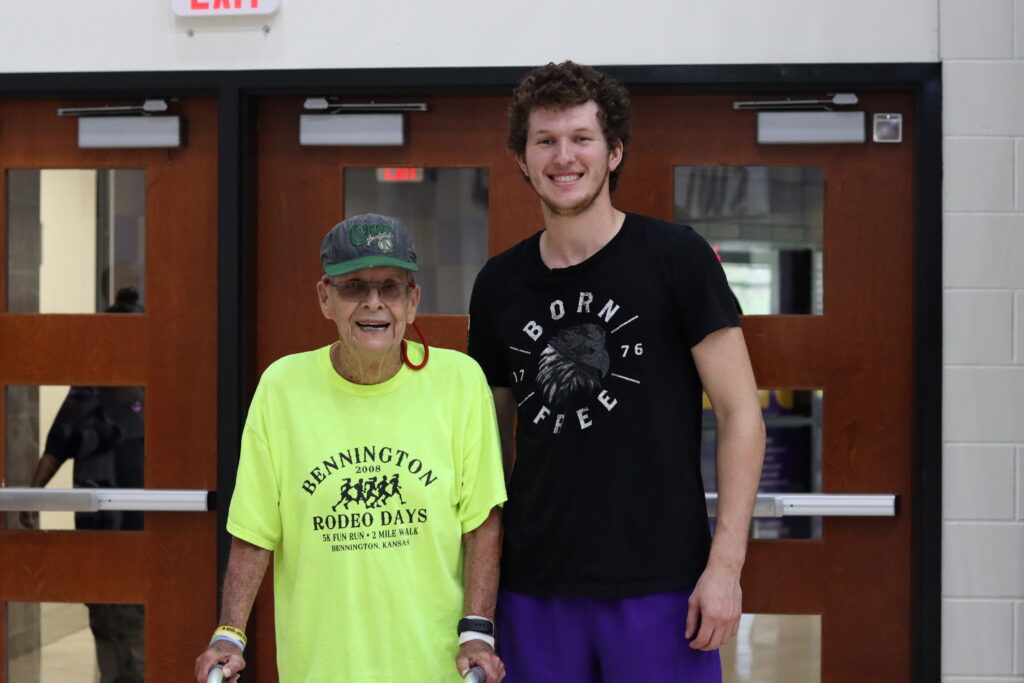When Gary Cassel graduated from Kansas Wesleyan in the spring of 1955, he assumed his major accomplishment on the basketball court would be surpassed sooner rather than later.
The 1,544 points he scored during his four seasons at KWU had moved him atop the career scoring list.
“I just assumed that in three or four years somebody would come along and break it, but it just kept going, and kept going which amazed me,” said Cassel, who is 91 and resides in Salina. “I’m just curious as to when this is going to happen. Maybe it, supposedly, is coming.”
There is indeed a strong chance the 69-year-old record will fall during the 2024-25 season, eclipsed by forward Alex Littlejohn who has 1,260 points entering his senior season.
Littlejohn averaged 17.3 points this past season and, at that pace, would break the record around midseason. Cassel will be following the proceedings.
“I will be interested in seeing it get broken,” he said. “That’s fine with me — that’s what they’re there for, to get broken.”
Cassel also holds school career records for field goals made at 566 (Littlejohn has 476); field goals attempted at 1,270 (Littlejohn 894); and free throws made at 412 (Littlejohn 229). Littlejohn is 214 rebounds shy of Charles Fiffe’s career record of 1,149 set in 1950.
Littlejohn and Cassel met Wednesday during Cassel’s campus visit.
“It was cool to meet him and see how he’s doing,” Littlejohn said. “It was a long time ago, so it’s crazy that that record has been there for that long.”
Littlejohn’s focus, though, is not on the record.
“I’m not worried about it until next year,” he said. “If I get it, I get it; if I don’t, I don’t. It’s not about records and statistics, it’s about winning games. Always has been. All I care about, all our team cares about, is winning. Next year, we’ve got some goals that we need to achieve because we fell short this year.”
Cassel was a banker in Salina and worked in food service at Roosevelt-Lincoln and Lakewood middle schools. He played tennis and golf and was an accomplished senior athlete, frequently competing in the Salina Senior Games.
Cassel was a four-year starter at KWU, a three-time All-Kansas Conference First Team selection and in 1955 was an NAIA and Helms Foundation All-American. He was inducted into the Jerry Jones Kansas Wesleyan Coyote Athletic Hall of Fame in 1986.
On Wednesday, Cassel watched the Coyotes play a pick-up game, something that did not occur during his era.
“Season was over, you went to track, tennis or whatever, not continuing your basketball program,” he said. “So, I’m assuming that they should be better than what we were at that time, just primarily because of the time that they’re putting in.”
Cassel said most of his points were the result of two shots — one from the top of the circle, the other a drive to the basket and pull-up jump shot.
“Generally, I could get around the corner and get within five or six feet (of the basket) primarily parallel to the backboard,” he said. “Get my feet underneath me and I knew that one or two fakes I’d get (the defender) up in the air. He’s coming down and I’m going up. It worked out pretty good.”
The game has changed since he played and he points to one crucial addition.
“The 3-point line is a big item, for sure,” he said.
Cassel said he is amazed and dismayed that today’s basketball players appear deficient in one important skill.
“I have very little patience with basketball players that can’t hit their free throws,” he said. “It upsets me. I just don’t understand it. I doubt if I could hit them now, but I could back then. I spent time, time and time practicing.”
Cassel played for four coaches at KWU, starting with Wally Forsberg, then John Horner and Gene Bissell his sophomore year — Bissell, KWU’s football coach, stepping in as interim coach when Horner became ill. Swede Backstrom was the Coyotes’ coach his junior and senior seasons.
“Forsberg had a system that we loved,” he said. “It was a system that kept the free-throw lane open and was primarily the offense we used all the way through. We gave (Horner) ulcers. We didn’t play very well and he had to find another job.
“I enjoyed Gene immensely and he did a good job. He was one of my favorite coaches and favorite people. Everybody loved him, he just was a super guy. Swede Backstrom was a neat guy and a good coach. He knew what he was doing and got the best out of his players.”
Story by Bob Davidson


